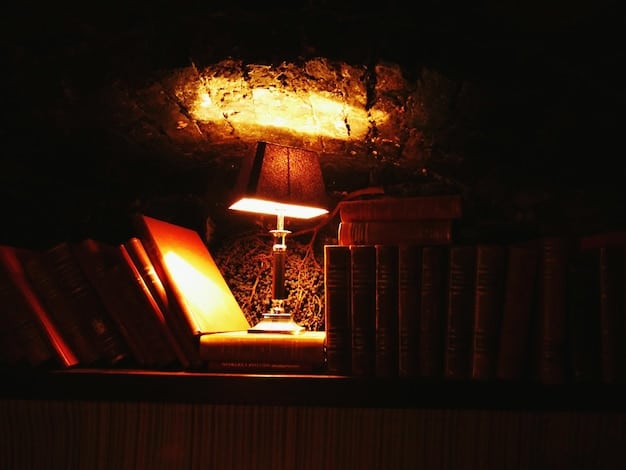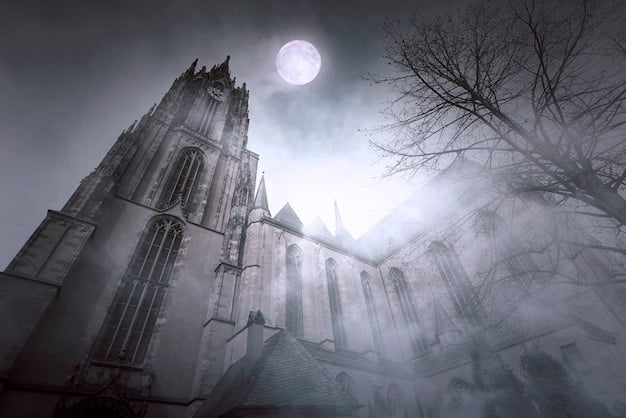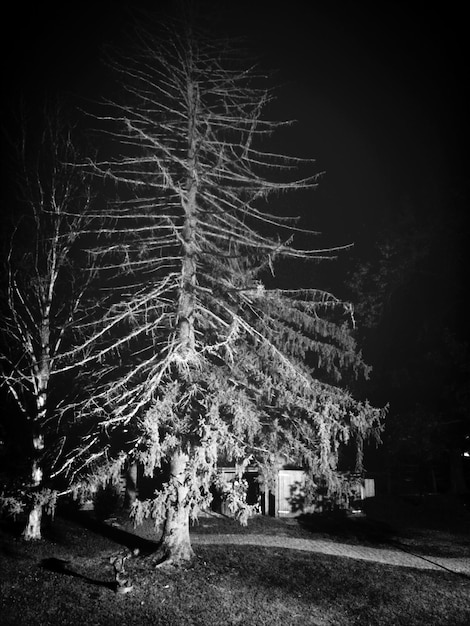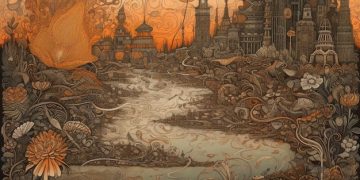Supernatural’s Allure: Unveiling the Secrets of Supernatural Novels

Supernatural novels captivate readers with their blend of imagination, suspense and exploration of the unknown, offering a thrilling escape into worlds where the boundaries of reality are constantly challenged.
The allure of the supernatural has permeated literature for centuries, and supernatural novels continue to captivate readers today. The blend of fantasy, horror, and suspense creates a unique reading experience, exploring themes of good versus evil, the nature of reality, and the power of the human spirit. Let’s delve into what makes the supernatural’s allure: exploring the enduring appeal of supernatural novels so irresistible.
The Historical Roots of Supernatural Novels
Supernatural fiction didn’t emerge overnight; it has roots that stretch back centuries. Understanding this history offers valuable insight into the genre’s modern appeal. From folklore to gothic tales, the seeds of the supernatural were sown long ago.
Early Folklore and Mythology
The earliest forms of supernatural storytelling come from folklore and mythology, where gods, demons, and magical creatures were integral parts of the narrative. These stories were not just entertainment; they were often explanations for the unknown and reflections of cultural beliefs.
- Ancient myths frequently featured deities with supernatural powers who influenced human affairs.
- Folk tales incorporated magical elements, with characters encountering spirits, witches, and enchanted objects.
- These narratives provided a framework for understanding the world and dealing with existential questions.
The Rise of Gothic Literature
Gothic literature, which flourished in the late 18th and early 19th centuries, brought a new level of sophistication to supernatural themes, combining them with elements of horror, romance, and psychological intrigue.

Characterized by dark, mysterious settings (often old castles or abbeys), dramatic intrigue, and a prevailing sense of dread, these stories tapped into readers’ anxieties about the unknown. Authors like Ann Radcliffe and Horace Walpole helped establish the conventions of gothic fiction, which continue to influence supernatural narratives today.
Supernatural novels are not just a modern invention; they have evolved from ancient folklore and gothic literature, each adding layers to the genre’s enduring appeal. Recognizing these historical roots illuminates the depth and complexity of contemporary supernatural fiction.
Defining Characteristics of Supernatural Novels
To truly appreciate the supernatural’s allure: exploring the enduring appeal of supernatural novels, it’s essential to understand the key elements that define the genre. These characteristics create the unique atmosphere and thematic depth that readers find so captivating.
Supernatural novels blend familiar reality with extraordinary elements. These are not simply fantasy stories; they are often grounded in a world that resembles our own, making the intrusion of the supernatural even more unsettling and intriguing.
The Blend of Reality and Fantasy
Supernatural novels often blur the lines between what is real and what is imagined, creating a sense of unease and wonder. This blending can take various forms.
- Urban Fantasy: Supernatural elements coexist with the everyday world, often in modern cities.
- Dark Fantasy: A subgenre emphasizing grim and gritty themes, contrasting with the hopeful tone of high fantasy.
- Gaslamp Fantasy: Blends historical settings, often Victorian or Edwardian eras, with gothic elements and fantastical creatures.
Recurring Themes in Supernatural Novels
Several themes are central to supernatural novels, contributing to their depth and universal appeal. Exploring these consistent elements can help in understanding the genre’s attraction.
Recurring themes such as morality, the battle between good and evil, and the exploration of mortality are prevalent, providing a rich landscape for character development and plot complexity. The supernatural world often serves as a metaphor for real-world issues and personal struggles.
Atmosphere and Setting
The setting in supernatural novels often plays a significant role in creating the overall atmosphere. A well-crafted setting can amplify the sense of unease and suspense.

Atmospheric descriptions that evoke a sense of mystery and suspense are common, and settings often include haunted houses, dark forests, and eerie urban landscapes.
Identifying and appreciating these defining characteristics allows one to fully engage with the depth and complexity of supernatural novels. The blend of reality and fantasy, recurring themes, and atmospheric settings all contribute to the genre’s lasting appeal.
Psychological and Emotional Appeal
Beyond their plot and characters, supernatural novels tap into deep psychological and emotional needs. Understanding this appeal helps clarify why so many readers are drawn to these stories.
Exploring the human psyche, with themes that resonate with fundamental human experiences, offers a cathartic release and a way to explore fears and desires. The emotional connection that readers form with the characters and their struggles is a key factor.
Exploring Fears and Anxieties
Supernatural novels often provide a safe space to explore our deepest fears. By confronting them within the context of a fictional narrative, readers can gain insight and perspective.
- The fear of the unknown is addressed through encounters with supernatural entities and hidden realms.
- Existential anxieties about mortality and the afterlife are explored through stories of ghosts, vampires, and other immortal beings.
- Personal fears and insecurities are often mirrored in the struggles of the characters against supernatural forces.
Wish Fulfillment and Escapism
For many, supernatural novels offer a form of escapism and wish fulfillment. They allow readers to imagine themselves in extraordinary situations and to experience the thrill of the impossible.
The ability to escape from reality and live vicariously through characters who possess extraordinary abilities is an attractive feature of the genre. These stories provide a sense of empowerment and the thrill of encountering the unknown.
Emotional Connection
Readers often form strong emotional connections with the characters in supernatural novels, empathizing with their struggles and celebrating their triumphs. This emotional investment enhances the reading experience.
Supernatural novels resonate with readers because they address deep-seated psychological and emotional needs. They provide a safe space to explore fears, offer escapism, and foster emotional connections, making the experience both engaging and cathartic.
The Supernatural in Different Subgenres
The supernatural is a versatile element that appears in various subgenres, each offering a unique twist. Recognizing these variations enriches the reader’s understanding and appreciation of the genre.
From horror to romance, the supernatural adapts to fit different narrative styles and thematic concerns, demonstrating its adaptability and enduring relevance. Examining how the supernatural manifests in these subgenres reveals its diverse nature.
Supernatural Horror
Supernatural horror combines traditional horror elements with supernatural beings and phenomena to create chilling narratives.
- Tales of haunted houses, demonic possessions, and vengeful spirits aim to evoke fear and terror.
- Authors like Shirley Jackson and Stephen King have mastered the blend of supernatural elements and psychological horror.
Supernatural Romance
Supernatural romance intertwines romantic themes with supernatural elements, often featuring love stories between humans and supernatural beings.
The “Twilight” series by Stephenie Meyer is a notable example, exploring the complicated romance between a human and a vampire. This subgenre often includes themes of forbidden love and acceptance.
Supernatural Thrillers
Supernatural thrillers combine suspenseful narratives with supernatural mysteries, creating thrilling and engaging storylines.
These stories often involve investigations into paranormal events, supernatural creatures, or ancient curses, keeping readers on the edge of their seats. The combination of suspense and supernatural intrigue makes for a compelling reading experience.
The supernatural adapts to a wide range of subgenres, from horror to romance to thrillers, showcasing its versatility and enduring appeal. Each subgenre offers a unique perspective on the supernatural, catering to diverse reader preferences.
Cultural and Societal Influences
The popularity of supernatural novels is often influenced by broader cultural and societal trends. Understanding these influences provides context for the genre’s enduring appeal.
Reflecting societal anxieties and aspirations, and tapping into collective fascination with the unknown, contributes to the genre’s continued relevance. These cultural influences provide a lens through which to view the themes and narratives of supernatural novels.
Reflecting Societal Anxieties
Supernatural fiction frequently mirrors contemporary societal anxieties, addressing fears and concerns through symbolic narratives.
The rise of vampire stories, for example, can be seen as a reflection of anxieties about disease, social control, and hidden identities. Understanding these connections enriches the reading experience and provides deeper insights into the cultural context of the novels.
Exploring Moral and Ethical Dilemmas
Supernatural novels often explore complex moral and ethical dilemmas, using supernatural scenarios to examine fundamental questions of right and wrong.
Stories involving moral ambiguity and the conflict between good and evil invite readers to contemplate their own values and beliefs. Exploring these moral and ethical dimensions adds depth and relevance to the supernatural narrative.
Impact on Popular Culture
Supernatural novels have had a significant impact on popular culture, influencing other forms of media such as film, television, and video games.
The adaptation of supernatural novels into successful film and TV franchises has extended their reach and introduced new audiences to the genre. Characters, themes, and storylines from supernatural literature often find their way into other cultural products, shaping the landscape of popular entertainment.
Supernatural novels are deeply intertwined with cultural and societal trends, reflecting societal anxieties, exploring moral dilemmas, and influencing popular culture. Recognizing these influences enhances the reader’s appreciation of the genre’s relevance and enduring appeal.
Tips for Enjoying Supernatural Novels
To fully appreciate the supernatural’s allure: exploring the enduring appeal of supernatural novels, approaching them with an open mind and a willingness to engage with their themes is essential. These tips will help you get the most out of your reading experience.
Embracing the imaginative world, engaging with the characters, and being open to new interpretations often leads to a deeply rewarding literary experience. Approaching supernatural novels with curiosity and willingness to suspend disbelief enhances the enjoyment and appreciation of the genre.
Approaching with an Open Mind
Come to the story with a willingness to suspend disbelief and embrace the imaginative world the author has created.
- Be open to new ideas and interpretations.
- Avoid being overly critical or skeptical.
Engaging with Characters and Themes
Invest time in understanding the motivations and struggles of the characters, and consider the deeper meanings and messages the author is conveying.
Pay attention to the symbolism and metaphors that may be present in the narrative. Consider how the themes relate to contemporary issues and personal experiences to enrich the reading experience.
Exploring Different Authors and Styles
Explore different authors and styles within the genre. Do not limit yourself to one author, series, or subgenre.
Discovering new authors and styles can broaden one’s appreciation for the variety and depth of supernatural novels. Experimenting with different approaches can lead to the discovery of new favorites and hidden gems.
Approaching supernatural novels with an open mind, engaging with the characters and themes, and exploring different authors and styles are all effective ways to enhance the reading experience. By embracing these tips, readers can unlock the full potential of this captivating genre.
| Key Point | Brief Description |
|---|---|
| 👻 Historical Roots | Evolved from folklore and gothic literature. |
| ✨ Key Elements | Blend of reality/fantasy, recurring themes. |
| 🧠 Psychological Appeal | Addresses fears, provides escapism. |
| 📚 Diverse Subgenres | Horror, romance, thrillers featuring the supernatural. |
FAQ
▼
Supernatural novels blend realistic elements with extraordinary events involving fantastical creatures or paranormal occurrences. They explore the extraordinary intruding into the mundane.
▼
Common themes include good vs. evil, fear of the unknown, exploration of morality, and the nature of reality. These provide moral and philosophical depth to the narratives.
▼
Supernatural narratives often reflect contemporary anxieties, using symbolic characters to address fears and concerns effectively. This makes the stories relatable.
▼
Atmosphere is crucial. Settings like haunted houses and dark forests heighten suspense and the sense of unease, enhancing the overall reading experience considerably.
▼
They offer escapism while exploring deep psychological themes. Readers can confront fears safely in imaginative worlds, finding emotional release in the unreal.
Conclusion
The supernatural’s allure: exploring the enduring appeal of supernatural novels rests in their ability to tap into our deepest fears, desires, and curiosities, offering an escape into worlds where the impossible becomes reality. By understanding their historical roots, key characteristics, and psychological appeal, readers can fully appreciate the immersive and thought-provoking nature of these captivating stories.





